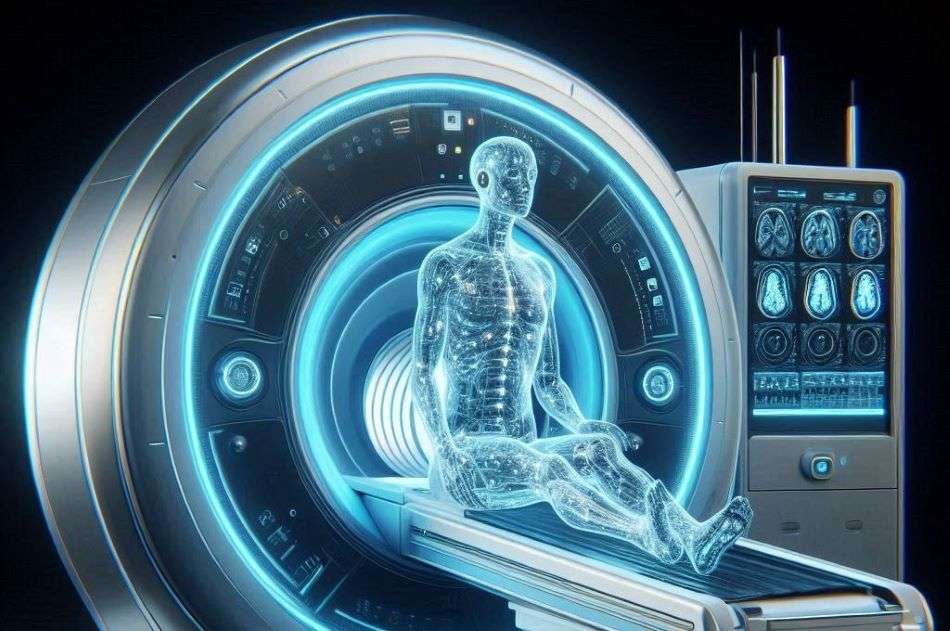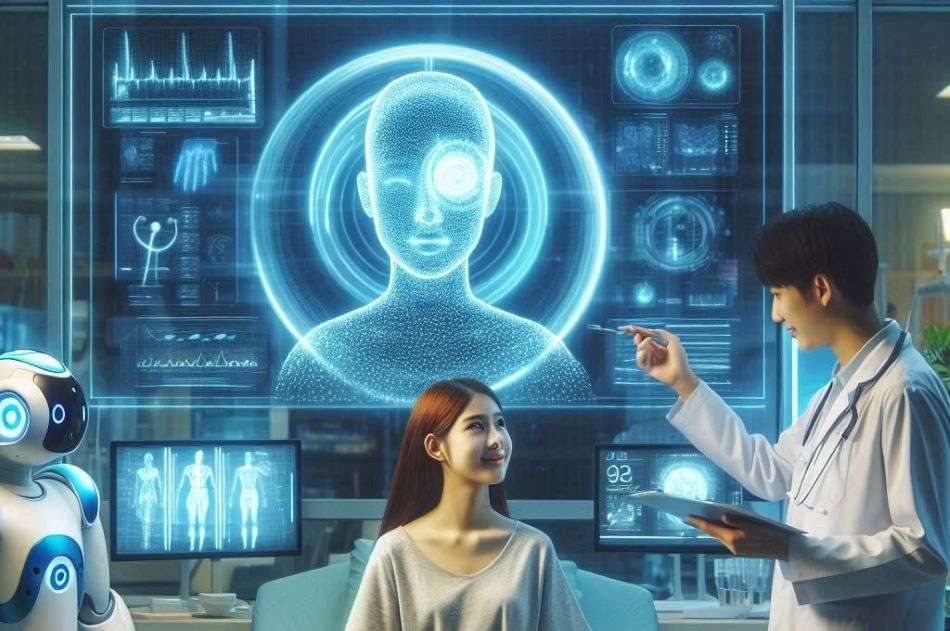The disruption of healthcare by AI: innovations, challenges, and the future

Artificial intelligence (AI) is no longer a futuristic concept in healthcare—it’s a tangible reality that’s reshaping patient care, diagnostics, and hospital operations. From analyzing complex genomic data to predicting patient outcomes with unprecedented accuracy, AI’s applications in medicine are vast and varied. In 2024, the global AI healthcare market is projected to exceed $20.9 billion, reflecting the growing adoption of this technology.
However, while AI holds immense promise, its integration into a field as sensitive and complex as healthcare requires careful consideration of both its potential benefits and challenges. This article dives into the key AI trends, highlights leading startups, examines the economic impact, and explores groundbreaking projects where this technology has been successfully implemented.
Healthcare by AI: Real-World Applications
AI in Diagnostics: Enhancing Precision and Speed
One of the most profound impacts of AI in healthcare is its role in diagnostics, particularly in complex fields like oncology. Companies like Tempus have transformed cancer care by using AI to analyze molecular and clinical data, helping doctors choose more effective treatment options. Tempus’s AI models can identify patterns in genetic data, assisting oncologists in personalizing therapy based on a patient’s unique genetic makeup.
This approach not only increases treatment accuracy but also speeds up decision-making processes, allowing for faster interventions that can be critical in life-threatening conditions.
PathAI is another player in this space, focusing on pathology. Its AI tools assist in diagnosing diseases by analyzing biopsy samples with greater precision than human review alone. Studies have shown that these tools can reduce error rates in identifying cancerous tissues, providing a second layer of scrutiny to improve diagnostic accuracy. These advancements help mitigate the risks of misdiagnosis, ensuring that patients receive timely and appropriate care.
Remote Monitoring: A New Era of Proactive Care
Remote patient monitoring, driven by AI, is also revolutionizing chronic disease management. Biofourmis, for example, uses AI algorithms to monitor patient data from wearable devices, predicting potential health complications before they become critical. Their platform analyzes real-time physiological data—such as heart rate, blood pressure, and oxygen levels—to detect subtle changes that could indicate a deteriorating condition. This approach enables healthcare providers to intervene early, reducing hospital readmissions and improving patient outcomes.
The impact of these solutions extends beyond individual patients, offering a scalable way to manage chronic diseases like heart failure and diabetes across large populations. As the world faces an aging demographic and an increasing prevalence of chronic conditions, AI-powered remote monitoring could be key to maintaining quality care without overwhelming healthcare systems
The Startup Landscape: Innovation, Strategies, and Challenges
Leaders in AI Healthcare Innovation
Several startups are leading the charge in applying AI to healthcare challenges. Spring Health uses advanced AI models to tailor mental health treatment for employees of large organizations. By analyzing individual data, their platform identifies the most effective treatment plans, reducing the time it takes for patients to find the right therapist or medication. This targeted approach has shown improvements in mental health outcomes, demonstrating the power of AI to enhance traditionally complex care pathways.
Another innovative startup is Komodo Health, which maps patient journeys to provide deeper insights into disease progression. Their data analytics tools help healthcare providers understand the effectiveness of different interventions over time, aiding in more strategic decision-making and better patient outcomes. These insights are particularly valuable for managing chronic conditions, where understanding long-term treatment impacts is crucial.
Funding Trends in AI Healthcare
The investment landscape for AI in healthcare is robust, with over $28 billion directed toward AI-driven solutions since 2020. Startups focusing on diagnostics, predictive analytics, and remote monitoring have attracted significant capital, reflecting investor confidence in technologies that address the industry’s biggest pain points, such as staffing shortages and rising healthcare costs.
However, the path to success is not without challenges. Startups often face hurdles like regulatory approval, the high cost of data acquisition, and competition from tech giants like Google and Amazon. Additionally, achieving integration with existing healthcare systems can be complex, requiring strong partnerships with healthcare providers and a deep understanding of clinical workflows.
Economic Impact and Workforce Transformation
AI’s Role in Easing Workforce Strains
AI is playing a pivotal role in addressing staffing shortages, a critical issue for healthcare systems worldwide. For instance, the NHS in the UK has implemented AI to assist radiologists in diagnosing fractures, aiming to reduce the burden on overworked professionals. With vacancy rates for radiologists as high as 12.5%, AI helps ensure that critical diagnostic services remain efficient and accurate despite staffing gaps.
By automating routine administrative tasks, such as appointment scheduling and billing, AI allows healthcare staff to focus on direct patient care. This is particularly beneficial in settings where clinicians spend up to 70% of their time on paperwork. As a result, hospitals can improve patient throughput without increasing workloads, leading to better job satisfaction and reduced burnout among healthcare workers.
Balancing Automation with Augmentation
While there are fears that AI could replace jobs in healthcare, most experts agree that the technology is more likely to augment roles rather than eliminate them. A McKinsey analysis suggests that only about 15% of healthcare tasks are fully automatable. Instead of replacing doctors and nurses, AI can provide them with tools that improve decision-making, such as clinical decision-support systems that suggest potential diagnoses based on a patient’s symptoms and medical history.
The economic benefits are also notable. AI’s ability to optimize resource allocation, predict patient influx, and manage hospital logistics can lead to substantial cost savings. For instance, predictive AI models can help hospitals adjust staffing levels based on expected patient volumes, reducing the need for expensive last-minute hires
Ethical Considerations and Regulatory Challenges
Data Privacy and Security Concerns
One of the biggest challenges in deploying AI in healthcare is ensuring data privacy. AI systems require access to vast amounts of patient data, raising concerns about how this information is stored and protected. Compliance with regulations like GDPR in Europe and HIPAA in the U.S. is critical, as any breach could severely damage public trust in these technologies.
The NHS’s recent project with AI for fracture detection, which involves using AI tools like TechCare Alert and BoneView, is a case in point. The initiative is designed to complement human expertise rather than replace it, with all AI-generated results being reviewed by a trained professional. This dual-review process helps maintain a balance between leveraging AI’s efficiency and ensuring that patient care decisions remain in human hands.
Building Trust Through Transparency
Trust is another crucial factor for AI adoption in healthcare. Clinicians often express concerns about relying on algorithms for critical decisions, fearing that AI might overlook nuances that a human doctor would catch. To address this, many AI developers are focusing on creating explainable AI (XAI) models that make their decision-making processes more transparent. This approach allows doctors to understand how the AI reached a particular conclusion, fostering greater confidence in its use.
The Future of AI in Healthcare: What’s Next?

Adaptive AI: A New Frontier
Adaptive AI, which can adjust its algorithms based on real-time changes in patient conditions, is expected to become a game-changer in healthcare. For instance, AI systems that can modify treatment recommendations based on continuous monitoring data have the potential to significantly improve outcomes for patients with complex conditions like heart failure or diabetes. This flexibility makes adaptive AI particularly suited for managing chronic diseases, where patient conditions can fluctuate frequently.
AI in Emerging Markets: Expanding Access
AI is also helping to address healthcare disparities in underserved regions. In countries across Africa and Southeast Asia, AI-powered mobile diagnostics are providing communities with access to essential healthcare services that were previously unavailable. These innovations not only extend care to remote areas but also reduce the strain on local healthcare infrastructure by enabling early detection of diseases.
AI Health Wearable Devices: Real-Time Monitoring
Health wearables have evolved significantly, moving beyond simple fitness tracking to sophisticated medical-grade monitoring. Garmin, known for its advanced sports and health monitoring capabilities, offers devices that are particularly popular among athletes and individuals needing detailed health insights. Garmin’s smartwatches, like the Fenix and Forerunner series, provide in-depth metrics, including heart rate variability (HRV), advanced sleep analysis, VO2 max, and even body battery metrics that estimate energy levels throughout the day. What sets Garmin apart is its ability to integrate with third-party medical applications, allowing for a broader ecosystem of health data.
Advanced Wearables for Continuous Glucose Monitoring (CGM)
Beyond traditional wearables, devices like continuous glucose monitors (CGMs) have seen significant advancements, often utilizing AI for real-time analysis and feedback. Companies like Dexcom and Abbott (with their Freestyle Libre series) are leading the market in CGMs. These devices use AI to interpret blood glucose levels, sending real-time alerts to users when their glucose levels become too high or low. This capability is crucial for individuals with diabetes, as it allows them to adjust their diet, exercise, or insulin dosage promptly.
Newer innovations include bio wearables like the K’Watch Glucose by PKvitality, which integrates a sensor into a smartwatch that can monitor glucose levels without the need for finger pricks. These devices use micro-needles that penetrate the skin minimally, analyzing glucose levels in interstitial fluid and providing results that are comparable to traditional blood tests.
Long-Term Vision: AI and Quantum Computing
Looking ahead, the convergence of AI with other cutting-edge technologies like quantum computing could revolutionize drug discovery. Quantum-powered AI models could simulate molecular interactions at an unprecedented scale, accelerating the development of new therapies for diseases that have been challenging to treat. While still in its early stages, this intersection represents a promising direction for future research and investment.
Balancing Innovation with Responsibility
AI is set to play an integral role in the future of healthcare, offering the potential for more personalized, efficient, and cost-effective care. Yet, realizing this potential requires a balanced approach that combines technological innovation with a commitment to ethical standards and patient trust. As projects like the NHS’s AI-assisted fracture detection demonstrate, the key to successful AI integration lies in using the technology to enhance human expertise rather than replace it. By focusing on collaboration between AI developers, healthcare providers, and regulators, we can ensure that AI becomes a trusted partner in delivering better healthcare for all.




